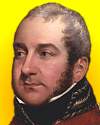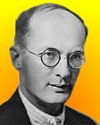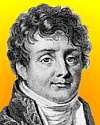 | TODAY IN SCIENCE HISTORY
NEWSLETTER - 16 MAY |
 On 16 May 1828, Sir William Congreve died, the English artillery officer who invented a rocket (about 1804) for use in warfare that improved on simple black-powder rockets. On 16 May 1828, Sir William Congreve died, the English artillery officer who invented a rocket (about 1804) for use in warfare that improved on simple black-powder rockets.
He was also inventive in other fields, as you may read in this Obituary of Sir William Congreve (1828). |
 On 16 May 1943, during WW II, bombs invented by Dr Barnes Wallis were dropped in Germany. They had been designed for one particular purpose - breaching dams, to result in flooding industrial facilities. To be effective, Wallis came up with a very innovative method for delivering the bomb from an aircraft. Today's Science Store pick is: Dam Busters, by Paul Brickhill. This books covers not only the scientific testing and technical problems that Wallis had to overcome, but also the human and military aspects of the bombing run. Available Used from $0.01 (as of time of writing). On 16 May 1943, during WW II, bombs invented by Dr Barnes Wallis were dropped in Germany. They had been designed for one particular purpose - breaching dams, to result in flooding industrial facilities. To be effective, Wallis came up with a very innovative method for delivering the bomb from an aircraft. Today's Science Store pick is: Dam Busters, by Paul Brickhill. This books covers not only the scientific testing and technical problems that Wallis had to overcome, but also the human and military aspects of the bombing run. Available Used from $0.01 (as of time of writing). Yesterday's pick: Frank Hornby: The Boy Who Made $1,000,000 With a Toy, by M. P. Gould.
For picks from earlier newsletters, see the Today in Science Science Store home page. | |
 | "It is an old saying, abundantly justified, that where sciences meet there growth occurs. It is true moreover to say that in scientific borderlands not only are facts gathered that [are] often new in kind, but it is in these regions that wholly new concepts arise. It is my own faith that just as the older biology from its faithful studies of external forms provided a new concept in the doctrine of evolution, so the new biology is yet fated to furnish entirely new fundamental concepts of science, at which physics and chemistry when concerned with the non-living alone could never arrive."
- Sir Frederick Gowland Hopkins, English biochemist (died 16 May 1947)  |

| "In the field one has to face a chaos of facts, some of which are so small that they seem insignificant; others loom so large that they are hard to encompass with one synthetic glance. But in this crude form they are not scientific facts at all; they are absolutely elusive, and can be fixed only by interpretation, by seeing them sub specie aeternitatis, by grasping what is essential in them and fixing this. Only laws and gerneralizations are scientific facts, and field work consists only and exclusively in the interpretation of the chaotic social reality, in subordinating it to general rules."
- Bronislaw (Kasper) Malinowski, Polish-British anthropologist who is regarded as the father of the functional school of anthropology (died 16 May 1942)  |
 | "The deep study of nature is the most fruitful source of mathematical discoveries. By offering to research a definite end, this study has the advantage of excluding vague questions and useless calculations; besides it is a sure means of forming analysis itself and of discovering the elements which it most concerns us to know, and which natural science ought always to conserve." - French mathematician in the quiz below (died 16 May 1830)  |
| Before you look at today's web page, see if you can answer some of these questions about the events that happened on this day. Some of the names are very familiar. Others will likely stump you. Tickle your curiosity with these questions, then check your answers on today's web page. |

|  J. Georg Bednorz, born 16 May 1950, was a German physicist who (along with Karl Alex M�ller) was awarded the 1987 Nobel Prize for Physics for their joint discovery of superconductivity in certain substances. J. Georg Bednorz, born 16 May 1950, was a German physicist who (along with Karl Alex M�ller) was awarded the 1987 Nobel Prize for Physics for their joint discovery of superconductivity in certain substances.
 What was remarkable about the superconductivity in these substances? What was remarkable about the superconductivity in these substances? |
|  Nicolas-Louis Vauquelin, born 16 May 1763 was French chemist who discovered two metallic elements around 1797. Nicolas-Louis Vauquelin, born 16 May 1763 was French chemist who discovered two metallic elements around 1797.
 Can you name either element? Can you name either element? |

|  This French mathematician (1768-1830), was known also as an Egyptologist and administrator, who exerted strong influence on mathematical physics through his Th�orie analytique de la chaleur (1822; The Analytical Theory of Heat). He showed how the conduction of heat in solid bodies may be analyzed in terms of infinite mathematical series now called by his name. This French mathematician (1768-1830), was known also as an Egyptologist and administrator, who exerted strong influence on mathematical physics through his Th�orie analytique de la chaleur (1822; The Analytical Theory of Heat). He showed how the conduction of heat in solid bodies may be analyzed in terms of infinite mathematical series now called by his name.
 What is this series, or this man's name? What is this series, or this man's name? |
|  On 16 May 1866, a beverage was invented by Charles Elmer Hires. On 16 May 1866, a beverage was invented by Charles Elmer Hires.
 What beverage did he invent? |

|  On 16 May 1943, during WW II, bombs invented by Dr Barnes Wallis were dropped in Germany. They had been designed for one particular purpose - breaching dams, and had a very unusual mode of arriving at their target. On 16 May 1943, during WW II, bombs invented by Dr Barnes Wallis were dropped in Germany. They had been designed for one particular purpose - breaching dams, and had a very unusual mode of arriving at their target.
 What was the special delivery mode Wallis designed for these bombs? |
|  On a certain 16 May, nicotine was declared to be addictive in ways similar to heroin and cocaine, in a report released by the U.S. Surgeon-General. On a certain 16 May, nicotine was declared to be addictive in ways similar to heroin and cocaine, in a report released by the U.S. Surgeon-General.
 In what decade was this report made? |
When you have your answers ready to all the questions above, you'll find all the information to check them, and more, on the May 16 web page of Today in Science History. Or, try this link first for just the brief answers.
Fast answers for the previous newsletter for May 15: Pierre Curie; pulse radar; bright points of light that appear around the edge of the moon during a solar eclipse; four million pairs; Britain.
|
 If you enjoy this newsletter, the website, or wish to offer encouragement or ideas, please send feedback by using your mail reader Reply button. If you enjoy this newsletter, the website, or wish to offer encouragement or ideas, please send feedback by using your mail reader Reply button. |
--
If you do not want to receive any more newsletters,
Unsubscribe To update your preferences and to unsubscribe visit
this link 


 On 16 May 1828, Sir William Congreve died, the English artillery officer who invented a rocket (about 1804) for use in warfare that improved on simple black-powder rockets.
On 16 May 1828, Sir William Congreve died, the English artillery officer who invented a rocket (about 1804) for use in warfare that improved on simple black-powder rockets.



 J. Georg Bednorz, born 16 May 1950, was a German physicist who (along with Karl Alex M�ller) was awarded the 1987 Nobel Prize for Physics for their joint discovery of superconductivity in certain substances.
J. Georg Bednorz, born 16 May 1950, was a German physicist who (along with Karl Alex M�ller) was awarded the 1987 Nobel Prize for Physics for their joint discovery of superconductivity in certain substances. What was remarkable about the superconductivity in these substances?
What was remarkable about the superconductivity in these substances? Nicolas-Louis Vauquelin, born 16 May 1763 was French chemist who discovered two metallic elements around 1797.
Nicolas-Louis Vauquelin, born 16 May 1763 was French chemist who discovered two metallic elements around 1797. Can you name either element?
Can you name either element?
 This French mathematician (1768-1830), was known also as an Egyptologist and administrator, who exerted strong influence on mathematical physics through his Th�orie analytique de la chaleur (1822; The Analytical Theory of Heat). He showed how the conduction of heat in solid bodies may be analyzed in terms of infinite mathematical series now called by his name.
This French mathematician (1768-1830), was known also as an Egyptologist and administrator, who exerted strong influence on mathematical physics through his Th�orie analytique de la chaleur (1822; The Analytical Theory of Heat). He showed how the conduction of heat in solid bodies may be analyzed in terms of infinite mathematical series now called by his name. What is this series, or this man's name?
What is this series, or this man's name?  On 16 May 1866, a beverage was invented by Charles Elmer Hires.
On 16 May 1866, a beverage was invented by Charles Elmer Hires. What beverage did he invent?
What beverage did he invent?
 On 16 May 1943, during WW II, bombs invented by Dr Barnes Wallis were dropped in Germany. They had been designed for one particular purpose - breaching dams, and had a very unusual mode of arriving at their target.
On 16 May 1943, during WW II, bombs invented by Dr Barnes Wallis were dropped in Germany. They had been designed for one particular purpose - breaching dams, and had a very unusual mode of arriving at their target. What was the special delivery mode Wallis designed for these bombs?
What was the special delivery mode Wallis designed for these bombs? On a certain 16 May, nicotine was declared to be addictive in ways similar to heroin and cocaine, in a report released by the U.S. Surgeon-General.
On a certain 16 May, nicotine was declared to be addictive in ways similar to heroin and cocaine, in a report released by the U.S. Surgeon-General. In what decade was this report made?
In what decade was this report made? If you enjoy this newsletter, the website, or wish to offer encouragement or ideas, please send feedback by using your mail reader Reply button.
If you enjoy this newsletter, the website, or wish to offer encouragement or ideas, please send feedback by using your mail reader Reply button. 

Δεν υπάρχουν σχόλια:
Δημοσίευση σχολίου